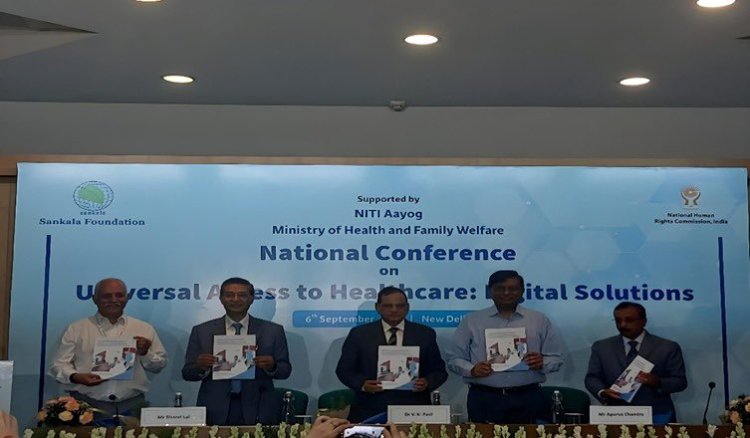Strong primary healthcare system is of high priority to reduce healthcare burden in later ages: Dr V K Paul
Shri Apurva Chandra, Union Health Secretary, discussed the success of digital platforms like CoWIN and Aarogya Setu, which played key roles in delivering over 220 crore vaccinations in India.

- Country:
- India
Dr. V K Paul, Member (Health), NITI Aayog, inaugurated the National Conference on “Universal Access to Healthcare: Digital Solutions” in New Delhi. The conference, organized by the National Human Rights Commission (NHRC) in collaboration with the Sankala Foundation and supported by NITI Aayog and the Ministry of Health and Family Welfare, aimed to explore digital healthcare solutions to enhance access to affordable, quality healthcare, particularly for rural, remote, and hilly regions. Key points from Dr. V K Paul’s address:
Emphasized the transformative changes in India’s healthcare sector, with a focus on strengthening primary healthcare systems to reduce healthcare burdens in later stages of life.
Highlighted five key principles for digital health solutions:
Scaling digital technologies for widespread use.
Ensuring new technologies like AI and robotics are accessible to all, avoiding the digital divide.
Promoting inclusivity, human rights, and protection from cyber fraud in digital health solutions.
Simplifying, not complicating, the lives of beneficiaries through digital solutions.
Enhancing the quality of life and incorporating traditional knowledge in healthcare.
Shri Apurva Chandra, Union Health Secretary, discussed the success of digital platforms like CoWIN and Aarogya Setu, which played key roles in delivering over 220 crore vaccinations in India. He noted that the Ayushman Bharat Digital Mission aims to replicate this success by integrating various healthcare portals such as Telemedicine, TeleManas, and eRaktKosh into a single platform. He also announced the upcoming U-Win portal, designed to maintain digital records of vaccinations and medicines for pregnant women and children, and progress in developing the National Health Claims Exchange to enhance transparency in health insurance claims.
Shri Bharat Lal, Secretary General of NHRC, stressed that healthcare is a fundamental human right and that digital technologies offer a significant opportunity to achieve universal healthcare. NHRC is actively involved in healthcare initiatives, including mental health and leprosy.
The event also featured the release of a report on 'Leveraging Digital Solutions for Universal Health Coverage', based on research by the Sankala Foundation, and three technical sessions on healthcare models, future frontiers in digital health, and technology-enabled universal health coverage.
Experts from WHO, UNDP, innovators from civil society, startups, and senior government officials participated in the event, emphasizing the importance of digital innovation in transforming India’s healthcare landscape.










